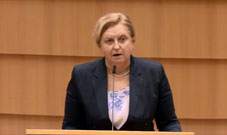
MEPs Demand Mikheil Saakashvili be Transferred Abroad for Medical Treatment at Debate
By Liza Mchedlidze
Friday, February 3, 2023
Member of European Parliament Anna Fotyga's requested immediate debate regarding Mikheil Saakashvili's health condition, supported by fellow Members of EU Parliament was held and the MEPs talked about the health condition of the former president of Georgia.
The European Parliament members demand that the government of Georgia immediately take measures to make it possible to transfer Mikheil Saakashvili abroad for medical treatment and stated that Georgian authorities are fully responsible for his well-being.
MEP Miriam Lexmann said that Mikheil Saakashvili's life is in danger and called out Georgian officials on 'shameful' behavior, adding that Saakashvili's situation will affect Georgia's European future:
"The life of the former president, Mr. Saakashvili, is in danger. This shameful behavior of the Georgian government is directly related to the country's European future. I once again ask the Georgian government to allow him to receive medical assistance abroad. The Government of Georgia is fully responsible for his life and health and will also be responsible if anything happens to him." Miriam Lexmann said.
Lithuanian MEP Petras Austrevicius questioned Georgia's alignment with the West and said that there is a political struggle and polarized society in Georgia.
"The current government of Georgia claims to be pro-European and aligns itself with the West, at the same time the society is very polarized and there is a political struggle that shows us a certain political culture. Mikheil Saakashvili, the former president who transformed Georgia, has now been imprisoned for 16 months. I demand that Mikheil Saakashvili be allowed to go abroad for medical assistance. The chances that the country will lose its European face are very high." Petras Austrevicius said.
MEP Anna Fotyga, who initiated this debate, said that the death of former President of Georgia will deeply affect Georgia's future, she also emphasized Vladimir Putin's intentions citing his past statements about Saakashvili:
"Several years ago, Putin personally described the treatment he wanted for Mikheil Saakashvili. Like any other person, Saakashvili had the right to return to his homeland, so he returned... I call on the Georgian government to release him so that he can receive medical care abroad. He is dying in prison and this will greatly affect the future of Georgia." Anna Fotyga said.
Johannes Hahn, European Commissioner for Budget and Administration said that Georgian government has a legal obligation to ensure that prisoners' fundamental rights are protected and said that European Union is ready to help Georgian partners with independent evaluation of Saakashvili's situation:
"In the previous case, we repeated that it is the responsibility of the Georgian government to take all measures to protect the health of Mr. Saakashvili. They have a legal obligation to ensure that all prisoners have access to health care and that their fundamental rights are protected. ... The EU's position is clear that the Georgian government has a responsibility to act if Mr. Saakashvili's health is in critical condition. ...I think it is in everyone's interest that Mr. Saakashvili's situation be evaluated by an independent institution. The European Union is fully ready to help Georgian partners in this situation". Johannes Hahn said.
MEP Markéta Gregorová asked Georgian authorities to not think about political gains but the losses for Georgia's EU candidacy status by leaving Mikheil Saakashvili in prison to die.
"There is no conspiracy, for example, that we are paid by the "United National Movement" or that Mikheil Saakashvili recruited us, I have heard such things. We are concerned about this, because we should be. This is a deeply politicized case, a person dies in prison. I am asking the government of Georgia not to think only about the political points that can be gained by leaving him in prison, but also about the points that can be lost because today we have to talk about a political prisoner instead of the status of a candidate". Markéta Gregorová said.

